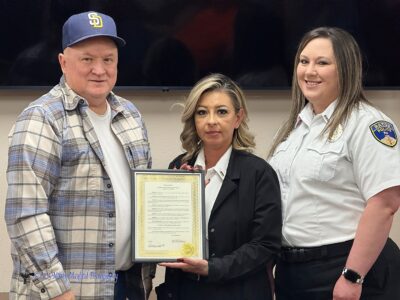Pueblo County Fleet Manager shows how Pueblo developed fleet of compressed natural gas powered vehicles
by Bill Knowles WALSENBURG — ”This just didn’t happen overnight,” the Director of Pueblo County Fleet Management, Carl Chavez, told members of the Southern Colorado Energy Council during a luncheon Friday, Aug. 21, at La Plaza Inn. “It involves a lot of work going to Denver, talking with politicians, and writing grants, but we were able to open a compressed natural gas (CNG) fill station August 9, in Pueblo.”
WALSENBURG — ”This just didn’t happen overnight,” the Director of Pueblo County Fleet Management, Carl Chavez, told members of the Southern Colorado Energy Council during a luncheon Friday, Aug. 21, at La Plaza Inn. “It involves a lot of work going to Denver, talking with politicians, and writing grants, but we were able to open a compressed natural gas (CNG) fill station August 9, in Pueblo.”
It took Chavez 10 years to bring together the reality of a CNG station. He formed a partnership between Pueblo County, Charles Ochs, owner of Acorn filling stations, and Sparq, owners of CNG fill stations, to pull the project together.
“Funding was tricky,” noted Chavez, “We found that most money was available to areas that have dirty air. We have clean air in southern Colorado, so that disqualified us from some federal funding.”
“Then we found we had to have at least ten CNG vehicles in the county’s fleet so the CNG infrastructure would be supported. The state requires its fleets in local area state offices to be CNG powered so the infrastructure is further supported by state vehicles.”
A real roadbock to southern Colorado counties that have low tax receipts is the purchase of new vehicles that can be converted to use CNG.
Even if a county were able to purchase ten new basic vehicles for $250,000 they would still have to fund an additional $80,000 to $100,000 to up fit the vehicle to use CNG.
Lee Merkel, from the Department of Local Affairs acknowledged that DOLA may be able to find grants that would allow a county to purchase new vehicles. Once ten vehicles have been purchased and “up-fit” to burn CNG, the county would be ready to build a fill station at a cost of $1 million. This is where a partnership like Chavez pulled together in Pueblo County comes into play. Grant funding, matches, and in kind work are important to government grant making agencies and private funders.
Karen Wilson, owner and operator of the La Plaza Inn, wanted to know where people fit in the scheme of things. “What place do regular drivers fill, where do they come in? So far this sounds like they’ve been excluded.”
“There are about 150,000 CNG powered private vehicles on U.S. roads right now. With the development of this kind of infrastructure more drivers will have more places they can refill their vehicles,” Chavez said, “People are taking advantage of the low cost of CNG, with the average price per gallon conversion being about $1.66 per gallon.”
“And,” Chavez said “natural gas burns cleaner.” The importance of CNG vehicles and stations is the savings in both fuel costs and slowing damage to the environment. Private owners can convert a newer vehicle from gasoline to CNG for about $7,000, with grants available for up to $7,500. But there aren’t many qualified gaseous conversion technicians in southern Colorado. Since most insurance companies and grant makers require certified conversion technicians the market is currently hindered.
If a CNG station is placed here in Huerfano County, it will anchor the I-25 side of U.S. Highway 160.

Southern Colorado Energy Council luncheon and tales of gas
More from NewsMore posts in News »




